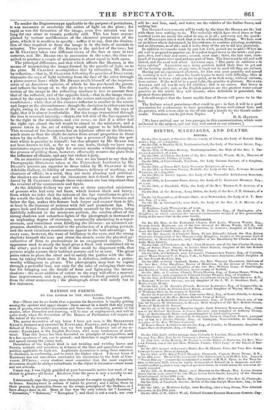HAYDON ON FRESCO.
TO TILE EDITOR OF THE SPECTATOR.
London, 31st August 1841.
SIR—There can be no doubt that a passion for decoration ierapidly getting among the opulent and upper classes : there cannot be a doubt that any young man of genius, who makes decoration and fresco the concluding portion of his studies, after dissection and drawing, will be sure of employment, and will be ;mite ready when the decoration of the Houses of Parliament will require all the talent of the country.
The purest decoration of any house I have yet seen, is Mr. BELLENDEN KERR'S, designed and executed by EASTLAKE, HARVEY, and a pupil from the School of Design. EASTLAKE was my first pupil, HARVEY one of my se- conds: EASTLAKE is the English POUSSIN, with more tenderness of senti- ment. That this house has been decorated on principles of composition, and its a fine specimen of art, can be proved ; and therefore It ought to be engraved and spread among the young men. Decoration of the highest kind is not twisting and twirling leaves and Bowers, animals and monsters, in defiance of the lines and quantities of com- position applicable to high art. Legitimate decoration is using these materials In obedience, in conformity, and to assist the higher object. I do not know if Rspnecr, has not sometimes overloaded his inventions by the fruit of GIO- VANNI D'UDINE every student must remember that the most exquisite decoration should be always subordinate to the object it decorates—must assist and not obtrude. I must say, I was highly gratified at your honourable notice last week of my sketch in genuine old fresco. Kindness from the press is now a novelty to me.
I strenuously urge the young men throughout the empire to apply themselves to fresco. Employment is certain if talent be proved ; and 1 advise them in their process to proceed in fresco on the simple principles of the Italians, as I have always done in oil. Seine di lino was the only vehicle for " Lazarus," "Jerusalem," "Solomon," "Xenophon'; and there is not a crack, nor ever will be: and lime, sand, and water, are the vehicles of the Italian fresco, and nothing but. Ten thousand new cements will be ready by the time the Houses are fit; but with them have nothing to do. The materials which have stood three or four hundred years are surely the safest to use, as in oil ; and carry not the quack- ery of MACGYLPS into a work that is to be a feature in Europe. We have now an architect who is determined, by his evidence, to combine painting, sculpture, and architecture, as of old ; and it is the duty of the art to aid him gloriously. In addition to remarks made by even last week, permit me to add—When an old wall is prepared to practise on, it is safest to get down to the brick ; and pre- pare, first, cow's hair and cross; second, next coat ; third, the last coat, com- posed of two parts ricer sand and one part of lime. The lime must be old and well slaked, and the sand well sifted. CENSER" says, " Due parte de sabbione e is terra calcine." ARMENINS says, many painters boiled their lime to get out all the heating qualities; at any rate, it must not be used till they are extinct. Having got an experienced plasterer, let him mix your quantity and spread it, working it well on : when the board begins to move with difficulty, then is the moment to trace what you are to paint, or to dash away, without cartoon, from nature. If the wall be in a good light, the practice is glorious. MICHAEL ANGELO said oil was fit only for children: this is an excess. But fresco is worthy of the gods; and, as the English painters are the greatest water-colour painters in the world, they will become, when definition is generated, the greatest fresco painters. I should suspect that the burnt marble lime of Devon will prove to be the best.
The Italians mixed pozzolana—that could be got : in fact, it will be a good speculation for a colourtnan to have pozzolana, Devon well-slaked lime, and tin palettes, with arisen edge on the off side and a handle for the thumb under-
neath. Pozzolana can be got from Naples. S S * B. R. HAYDON.
[We have omitted one or two passages in this communication, which were irrelevant to the subject, and not very well suited to our columns.]


























 Previous page
Previous page